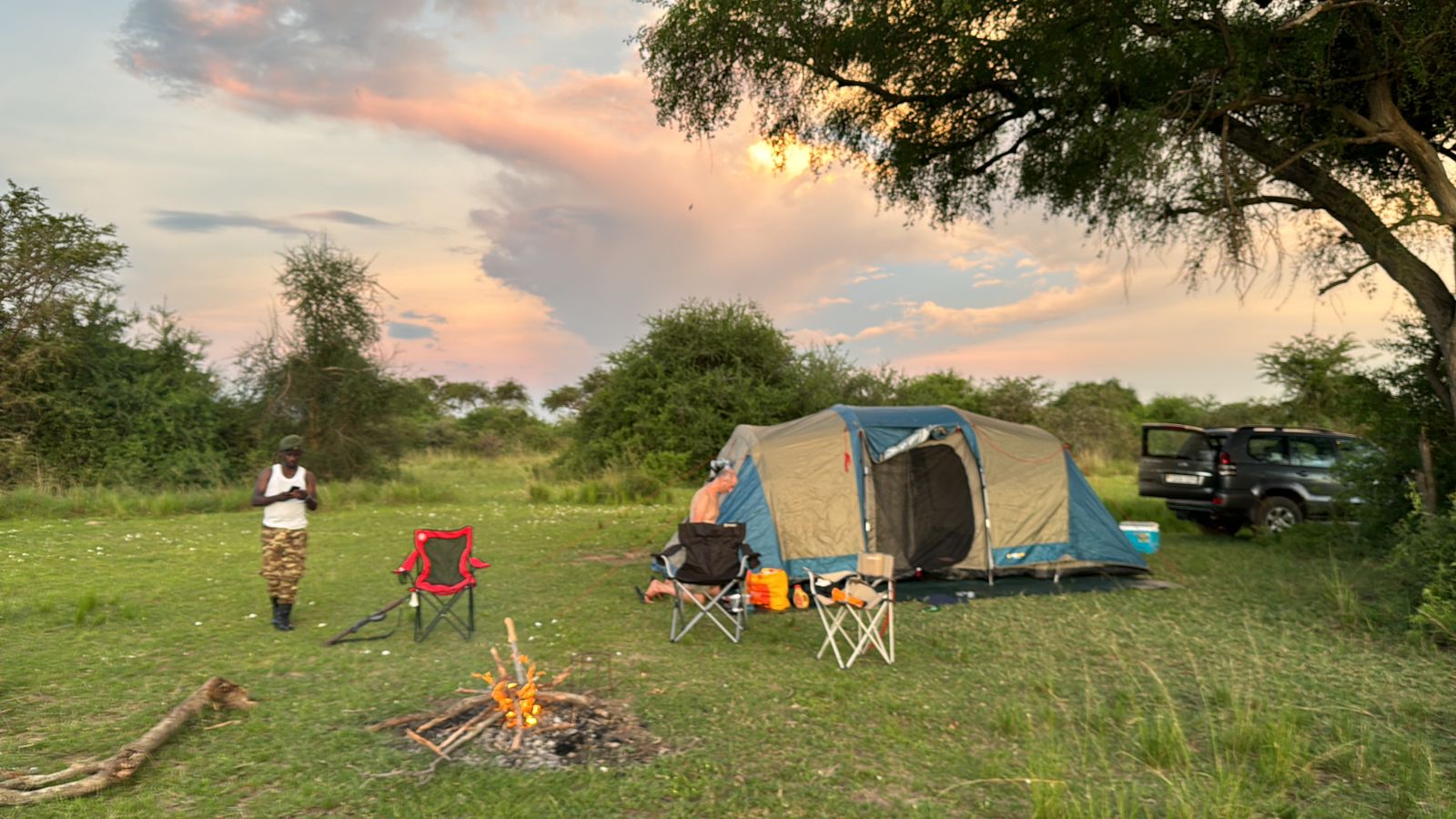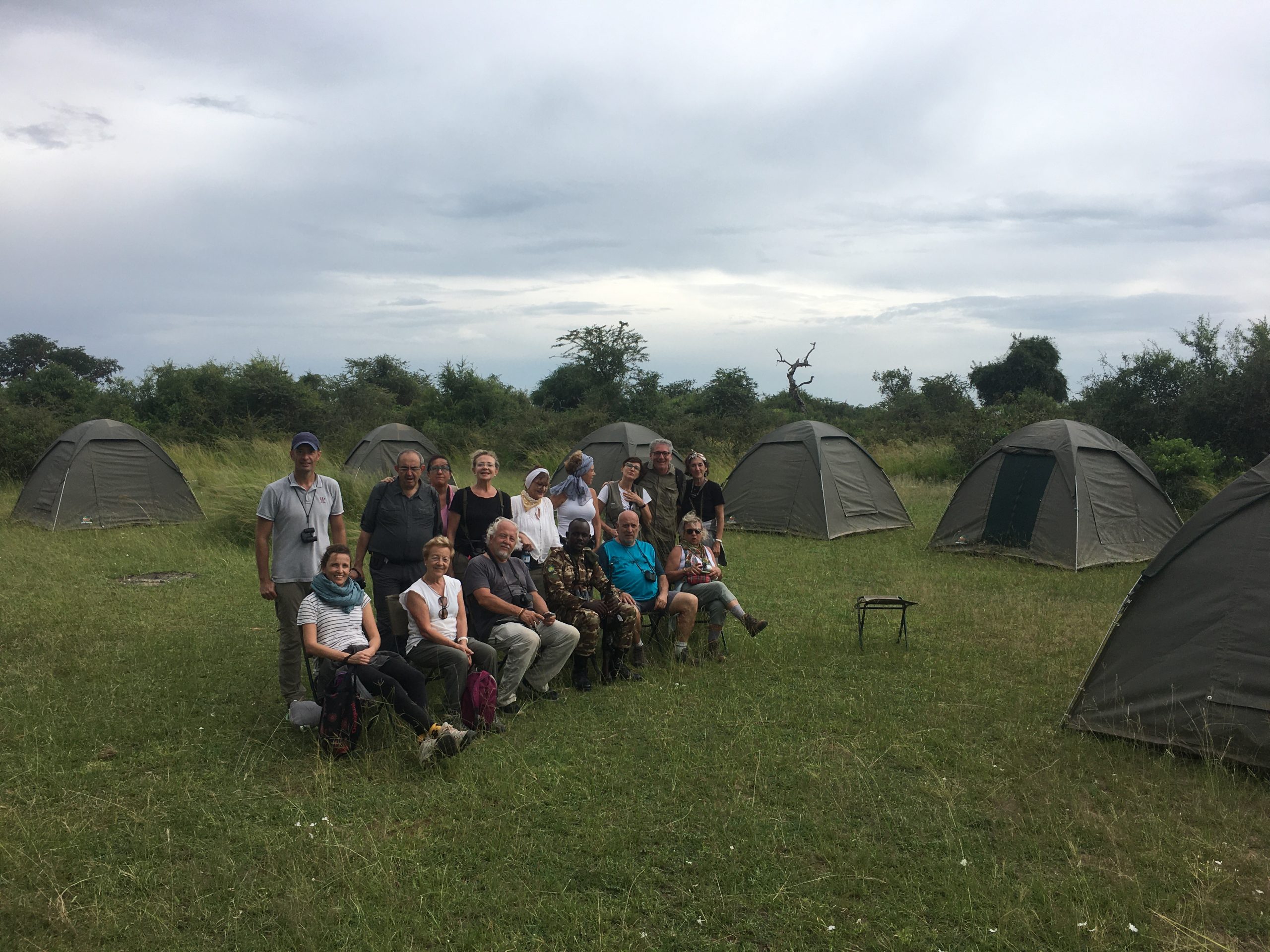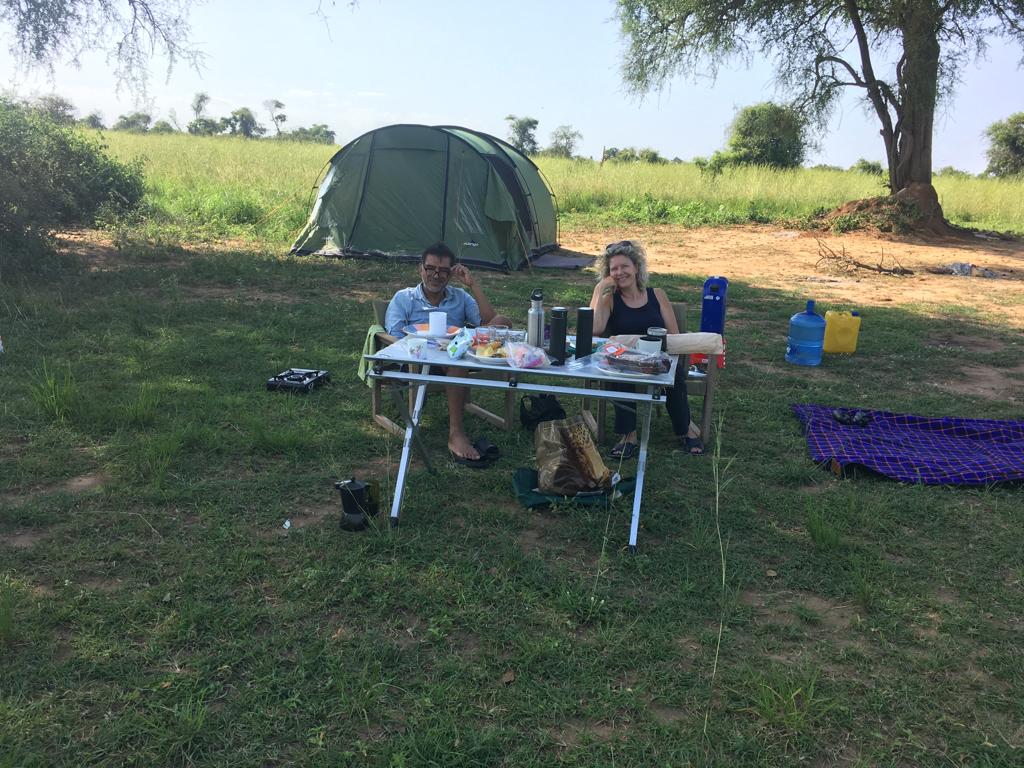WILD BUSH CAMPING AND EXPERIENCE IN UGANDA THE PEARL OF AFRIFCA
 Wild bush camping in Africa originated from the traditional hunting and exploration expeditions of European colonizers and adventurers in the 19th and early 20th centuries. They would venture into the wilderness, setting up makeshift camps to hunt, explore, and survive. Over time, this evolved into a form of tourism, allowing travelers to experience the thrill of camping in the African, apparently wilderness bush camping experience is done in almost all 10 national parks of Uganda including;
Wild bush camping in Africa originated from the traditional hunting and exploration expeditions of European colonizers and adventurers in the 19th and early 20th centuries. They would venture into the wilderness, setting up makeshift camps to hunt, explore, and survive. Over time, this evolved into a form of tourism, allowing travelers to experience the thrill of camping in the African, apparently wilderness bush camping experience is done in almost all 10 national parks of Uganda including;
- Murchison Falls National Park: named after the waterfall where the Nile River bursts through a narrow gorge; home to lions, elephants, Jackson’s hartebeest, big cats, Rothschild giraffes, and a variety of monkeys
- Queen Elizabeth National Park: named after the present queen of England; home to elephants, hippos, and chimpanzees as well as many bird species, reptiles like monitor lizards, and several big cat species
- Rwenzori Mountains National Park: home to forest elephants, black-and-white colobus monkeys, chimpanzees, hyraxes, chameleons, and many bird species that are only found in this region
- Bwindi Impenetrable National Park: best known for its mountain gorillas, but also home to chimpanzees, antelopes, elephants, and various birds
- Kibale National Park: offers great safari experiences with chimpanzees, elephants, leopards, warthogs, African buffalos, and over 375 bird species
- Kidepo Valley National Park: home to giraffes, lions, leopards, elephants, buffalos, antelopes, hyenas, cheetahs, and ostriches
- Lake Mburo National Park: features hundreds of bird species and animals like zebras, hippos, topis, crocodiles, Defassa waterbuck, and impalas
- Mgahinga National Park: home to mountain gorillas and golden monkeys
- Mount Elgon National Park: home to antelope, buffalo, elephants, blue monkeys, black-and-white colobus monkeys, and over 300 bird species
- Semuliki National Park: home to one of the most ancient forests on the African continent, providing a habitat for over 400 bird species in addition to various animals and reptiles
OBJECTIVES AND ADVANTAGES OF WILDERNESS BUSH CAMPING IN UGANDA.
Objectives? The three main objective of wild bush camping include;
- Connection with Nature: Bush camping allows individuals to immerse themselves in the natural environment, fostering a deeper appreciation and understanding of the outdoors. It provides an opportunity to disconnect from urban distractions and reconnect with the natural world.
- Personal Challenge and Growth: Bush camping often involves wilderness survival skills, such as building shelters, starting fires, and finding food. This helps build self-reliance, resilience, and confidence, as individuals learn to navigate and thrive in a challenging environment.
- Community Building and Teamwork: Bush camping typically involves group camping, encouraging teamwork, communication, and bonding among participants. Sharing experiences, skills, and responsibilities strengthens relationships and creates lasting memories

18th December 2023 Bush campers in Murchison falls national park Uganda-Africa.
Used ground tents, mounted with pegs and slings, armed ranger guide for interpretation security and giving historical attribute of the destination.
Advantages? They are five major advantage of wilderness bush camping in contrast to having accommodation in safari lodges.
- Immersive Experience: Wilderness Bush camping offers a more immersive experience, allowing you to connect with nature and wildlife in a more intimate way. You’re not separated from the environment by walls or fences, providing a more authentic experience.
- 2. Cost-Effective: Bush camping is generally more cost-effective than staying in safari lodges, which can literally be expensive. Camping allows you to save money on accommodation and allocate it to other activities or experiences (entry fees, chimp trekking, nature walks etc.
- Flexibility and Freedom: Bush camping offers the freedom to create your own discovered itinerary and camp at various scenic, strategic and solitary landscapes/campsites , allowing for a more flexible and spontaneous experience. You’re not bound by the schedule or rules of a lodge.
- Peace and Solitude: Bush camping provides a peaceful and serene environment, away from the noise and crowds of safari lodges. You can enjoy the sounds of nature and relax in tranquility.
- Authentic Adventure: Bush camping offers a more authentic adventure experience, allowing you to rough it and challenge yourself in the wilderness. You’ll develop survival skills, build your own shelter, and start your own camp fire, creating a sense of accomplishment and pride.

20th April 2024 Nyamisika cliff bush campsite in Murchison falls national park Uganda-Africa
With holistic attributes for camping experience including; Seclusion, Natural Beauty, Wildlife Viewing, Opportunities to spot local wildlife, nature walk , Peace and Quiet, A serene environment, free from noise pollution and distractions.
EXPECTATIONS AND EXPERIENCE OF WILDERNESS BUSH CAMPING IN UGANDA
Activities at the campsite and beyond campsite? There are six major activities done immediately on reaching the bush campsite including;
Initial Role of a ranger in bush campsite The ranger at first hand carries out safety and security survey around and in vicinity of the wilderness bush campsite, to ensure no nearby bush animals, no other campers, Briefing of clients on conduct and expectation; locate sanitation points, locate parking of the car, locate kitchen point, fire point, tent points and firewood collection.
- Setting up camp: Pitching tents, setting up sleeping areas, and organizing gear.
- Gathering firewood: Collecting firewood and kindling for building a campfire (if allowed by local regulations).
- Starting a campfire: Building and lighting a campfire for warmth, cooking, and light, social unit for storytelling.
- Purifying water: Treating or filtering water from a nearby source to make it safe for drinking (optionally carry mineral water in eco-friendly water containers).
- Setting up a food preparation area: Creating a clean and safe space for cooking and preparing meals.
- Securing food and trash: Storing food and trash properly to avoid attracting wildlife and maintaining a clean campsite.

Delta wilderness bush campsite in Murchison falls national park, 17th April 2024
Other activities done beyond campsite while at the wilderness bush capping include;
-Nature walks
-Night game drive
-Morning and evening safari game drive
-Bird watching and tree identification
-waterfalls viewing and hiking
-Gorilla and chimpanzee trekking
-sunrise and sunset viewing
-night experience, stars viewing, lion roars, birds calls
Living a roughing night, wilderness survival and primitive camping experience. What is it that wilderness camping experience offers participants?

1st June 2021 Victoria Valley bush camp site Murchison Falls Uganda
Memorable and lifetime experience: The immersion in nature, adventure and challenge resilience, connection with others, personal growth and self-discovery, un predictability and excitement and sense of accomplishment stays with campers longer after they leave the wilderness, shaping their perspectives, building character and fostering a deeper a appreciation for nature and themselves s
RECOMMENDABLE PREPARARATION AND TIPS; BEST TIME AND DURATION FOR BUSH CAMPING EXPERIENCE TOOLS AND MANDATORIES OF WILDERNESS BUSH CAMPING IN UGANDA
Tools and equipment required for wilderness bush camping?
| Shelter & sleeping gears | Cooking & eating gear | Lighting & safety gear | Hygiene & sanitation gears | Clothing & personal gear | Navigation & communication gear | Miscellaneous gears |
| – Tent
-Sleeping bag -Sleeping pad – Ground tarp -Camping stove – Fuel for stove |
– Cooking pot
– Eating utensils (e.g., fork or multi-tool) – Plates, bowls, cups – Water bottles or hydration bladder – Water purification tablets or filter – Food storage containers |
– Headlamp or flashlight
– Extra batteries – First aid kit – Fire starter (e.g., matches, lighter, fire starters) – Personal safety items (e.g., bear spray, pepper spray) |
– Biodegradable soap
– Toothbrush and toothpaste – Wet wipes – Hand sanitizer – Portable toilet (if needed) -machete and spade |
– Pack extra clothing and layers
– Rain gear (e.g., jacket, pants) – Hiking boots or sturdy shoes – Socks and underwear – Hat and gloves (depending on the season) – Personal hygiene items (e.g., feminine products, baby wipes) |
– Map
– Compass – GPS device or smartphone with GPS app – Two-way radio or satellite phone – Whistle All above may not apply if there is a field guide |
– Camp chair
– Camp shoes – Trash bags – Firewood (if allowed by local regulations) – S’mores ingredients (if you want to enjoy a campfire treat!) |
Organization (Uganda wildlife Authority) mandatories for bush camping experience?
- Valid visa and passport IDs for foreign non & foreign residents
- Valid national IDs for local citizens and East African Citizens
- Armed ranger for safety, security and interpretation guidance
- Valid national park entrance permits and camping tickets
What is the best time for bush camping in Uganda?
The best time for bush camping in Uganda is during the dry seasons, which are:
– June to August
– December to February
Uganda is a year-round camping destination, but these periods offer the best weather conditions and wildlife viewing opportunities. Additionally, you can expect:
– Little rainfall during June to July and January to February
– Peak of the wet season during March, April and May
– Some lodges and camps in high-rainfall areas might close down during the low season (March, April, May, October and November), and roads and forest trails can be in poor condition.
(Note: any travelling time for bush campers is favored provided with proper bush camping equipment and gears with local guide and the biggest challenge is un-predictable weather conditions and nervousness of campers)
How long is bush camping at particular site?
- Minimum of one night and maximum at choice depending on logistics capabilities and time by the campers

06th December 2023 Delta- Shoebill Camp site Murchison Falls National Park-Uganda
Global significances for wild safaris in tourism
- Financial Support for Conservation: Ecotourism generates income for conservation efforts, supporting the protection of natural habitats and wildlife.
- Community Engagement and Education: Ecotourism promotes awareness and understanding of local cultures and environmental issues, educating visitors and local communities about the importance of conservation.
- Job Creation and Income Generation: Ecotourism creates employment opportunities for local people, generating income and improving livelihoods, reducing poverty and dependence on natural resources.
- Sustainable Resource Management: Ecotourism encourages sustainable practices, such as responsible travel and eco-friendly accommodations, reducing the impact on the environment and promoting resource conservation.
- Cultural Heritage Preservation: Ecotourism helps preserve local traditions, customs, and cultural heritage, promoting cross-cultural understanding and exchange.
- Empowerment of Local Communities: Ecotourism empowers local communities to take ownership of conservation efforts, making them active stakeholders in the management and protection of natural resources.
By supporting ecotourism, travelers can contribute to the conservation of nature and improvement of local people’s livelihoods, promoting a sustainable and responsible tourism industry.
COST, BOOKING AND RESERVATION DETAILS?
Web: https://wildsteps-safaris.com
Email: info@wilstteps-safaris.com or silvamusobozi1@gmail.com
WhatsApp: +256784496328
